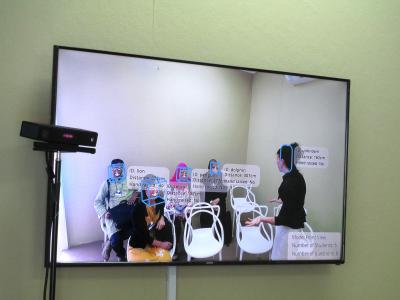$2.5m grant received to study the science of teaching

A new, five-year, $2.5 million research grant from the James S. McDonnell Foundation has been awarded to a team led by Carnegie Mellon University assistant professor Amy Ogan to study teacher learning in high-need settings.
While much of education research is focused on student performance, this study turns the focus to the development of the teacher. According to the McDonnell Foundation website, the Teachers as Learners program was established in 2017 to “fund education research on the science of teaching and expand our understanding of teachers as learners and as agents of change in education.”
Growing evidence indicates that when teachers lead students in structured classroom discussions that foster shared reasoning, students benefit with steep increases in learning. However, such discussion is rare -- especially in science classrooms with students from historically underserved backgrounds. In order to improve this situation, receiving constructive feedback about their instruction is critical to a teacher’s professional development, but performance feedback is not easy to come by. As a result, there has been rising interest in using technology to provide feedback about the core features of a teacher’s instruction.
The study will utilize the existing ClassInSight system to examine how high school science teachers learn to improve classroom communication by engaging in scaffolded noticing and reflection.
ClassInSight, a computer-vision based system, has been undergoing testing in two School of Computer Science classrooms for almost a year. Now, the system and its many sensors are ready to be installed in participating high school classrooms in California.
The ClassInSight system gathers anonymous data about the classroom instruction, and provides this information in a visual way that allows teachers to assess their performance. For example, a teacher can easily see if she waited the recommended 3 seconds or more after posing a question before answering it herself, or whether she should have given students more thinking time. Another series of charts on the dashboard shows other basic measurements, including the length of the class, talk time compared to silence, and how much time students spent with their hands raised.
The team, led by project manager Amy Ogan, is comprised of faculty from Carnegie Mellon University and the University of California San Diego, as well as educators from the Vista Research-Practice partnership (a collaboration between Vista Unified School District leadership and UCSD), a scientific advisory board, and a Distinguished Educator Advisory Panel. In addition to Ogan, other faculty from CMU include HCII professors John Zimmerman and Ken Koedinger. Zimmerman brings expertise in personal informatics and design-based research, and Koedinger, a member of the project’s scientific advisory board, adds his experience with cognitive science and modeling.
Earlier this year, Ogan and Zimmerman received an EAGER award for a related project, “Developing Teaching Assistant Expertise with a Sensor-Based Learning System.”
EAGER funding supports work in its early stages, especially "high risk - high payoff" projects that have the potential to transform an approach or discipline. This $300,000 award from the National Science Foundation uses the ClassInSight sensor technology to investigate how to support university teaching assistants (TAs) to acquire student-centered teaching skills before they transition to faculty. The team is developing an app so that the university TAs of STEM courses can access their teaching data on their phones after class.
The McDonnell Foundation grant provides funding to continue to develop the ClassInSight sensor technology and also expands the scope of work to include a high school classroom setting.
Official foundation press release January 17, 2018: James S. McDonnell Foundation Announces 2017 Grants for The 21st Century Science Initiative Awards (pdf)

